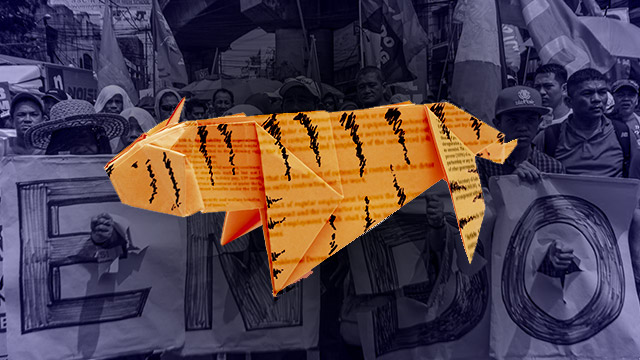SUMMARY
This is AI generated summarization, which may have errors. For context, always refer to the full article.
![[ANALYSIS] The paper tiger that was the anti-endo bill](https://www.rappler.com/tachyon/r3-assets/612F469A6EA84F6BAE882D2B94A4B421/img/B7F044DDEC2D4D0DA4FDA3DE34222A27/paper-tiger-endo.jpg)


There’s a lot of weeping and gnashing of teeth where “endo” is concerned. But are we all clear about what it means?
Since 2015, President Duterte has been promising to end once and for all the unlawful labor practice called endo, which derives from the phrase “end of contract.” He even certified the anti-endo bill as urgent in September 2018.
But on July 26, we learned that Duterte vetoed the anti-endo bill passed by Congress.
This veto is odd on two counts.
First, its announcement could not have been more chaotic. Palace Spokesperson Salvador Panelo announced the veto on the night of July 25, took it back 30 minutes later (blaming “poor hearing” and saying Duterte is “still studying the pros and cons”), then finally confirmed it the day after.
Second, the veto was not exactly a loss because even some labor groups found the bill to be nothing more than a paper tiger.
What exactly is endo? How weak was the anti-endo bill that Congress came up with? And was Duterte justified in vetoing it?
Defining endo
Before anything else, we need to pin down what exactly endo means.
Consider a shoe manufacturing firm. If it outsources security and janitorial services to third-party manpower agencies – services arguably inessential to the shoemaking business – that’s a perfectly acceptable form of outsourcing, and that’s not endo.
Endo, instead, could happen in two ways.
First, if the shoemaking firm directly hires shoemakers using “fixed-term” contracts that end in 5 months (otherwise known as “5-5-5” contracts) to evade regularizing and giving them the benefits that are due them, that’s endo.
Second, if the third-party manpower agencies hire security guards or janitors through similar 5-5-5 contracts – again to circumvent the law’s regularization requirements – that’s endo, too.
Note that endo is distinct from – and commonly conflated with – the hiring practice called “labor-only contracting.”
In our example, labor-only contracting would happen if the shoemaking firm hires shoemakers through another third-party manpower agency. Since shoemakers are directly related to the shoemaking business, you might argue they shouldn’t be outsourced as well.
Just how extensive are endo and labor-only contracting? It’s hard to say for sure, but we can look at indicative data.
As of May last year, the Department of Labor and Employment (DOLE) counted 224,852 workers hired through labor-only contracting, spread across nearly 100,000 establishments nationwide.
Note, however, that this number still excluded workers hired through endo.
Meanwhile, in 2016, official data showed there were 572,034 contractual or project-based workers in establishments hiring 20 or more employees (Figure 1). They constituted about half of all non-regular workers, and were found mostly in construction, administrative and support services, and wholesale and retail trade.
Lastly, there were more than 691,341 people hired through agencies in 2016, mostly factory workers, security guards, and janitors.
Figure 1.
Weak bill
Sad to say, many groups found the anti-endo bill that reached Duterte’s desk, Senate Bill 1826, weak for a number of reasons.
First, many blame the fact it was not harmonized with the House version, which many deemed more potent.
Second, the Senate bill stipulated that “all employees, except those under probationary employment, are deemed regular, including project and seasonal employees.”
But this is a mere codification of previous Supreme Court decisions which already considered project and seasonal employees regular in the duration of their work.
Third, unlike the House bill, the Senate bill also failed to explicitly mention anything about “fixed-term employment,” which previous Supreme Court decisions had previously ruled valid.
Fourth, the Senate bill provided that labor-only contracting happens if the workers recruited by third-party manpower agencies are “performing activities which are directly related to the principal business” of the firm.
But who’s to say such activities are “directly related” or not? That determination will fall on industry tripartite councils whose responsibilities are conspicuously unspecified in the bill. Absent any decision from them, that task will fall on the DOLE secretary.
This, however, leaves much room for discretion that might only allow businesses to continue skirting regularization requirements. In addition, as things stand, the DOLE secretary already passes judgment on cases relating to labor-only contracting.
Enforcement
In sum, lawyers say that the anti-endo bill adds little to the current body of labor regulations and court decisions on abusive labor practices.
Arguably far more pressing would be the immediate and effective enforcement of such laws.
In March 2017, Labor Secretary Silvestre Bello III signed a department order that made it more difficult for third-party manpower agencies to engage in contracting or subcontracting. But shrewd companies and third-party manpower agencies with deep pockets will find these added regulations easy to comply with.
More recently, DOLE also intensified its inspection of firms’ compliance with labor laws. Of the 474,329 workers regularized from 2016 to June 2019, Secretary Bello claimed 28% benefitted from their intensified inspections.
Secretary Bello admitted, though, that his hands are tied when it comes to contractual workers in government, more commonly known as “job order” or “contract of service” employees. In 2017 they numbered a whopping 660,390.
Capitulation
Weak as it is, the anti-endo bill was vetoed by Duterte for the wrong reasons.
Specifically, Duterte’s veto message betrays his woeful (but not altogether surprising) capitulation to the interests of big business.
For instance, Duterte – or rather his economic managers – said that “empirical data shows that the Philippines is currently at a disadvantage already in terms of cost and flexibility of labor use compared to its peers in the region.”
Many economists are only too familiar with this spiel: Higher labor costs are supposed to turn off prospective investors and hurt our competitiveness in the region.
Yet labor market regulations are, in fact, not top of mind for business owners.
The 2017-2018 Global Competitiveness Report showed that businesses in the Philippines were mostly concerned not with restrictive labor regulations but with inefficient government bureaucracy, inadequate infrastructure, and widespread corruption (Figure 2).
Meanwhile, in the latest Business Expectations Survey conducted by the Bangko Sentral, only 13% of businesses identified labor problems as a major constraint, vis-à-vis competition (55%) and insufficient demand (23%).
Figure 2.
Duterte’s veto message also mentioned that the anti-endo bill might “oppress or destroy capital and management” and disrupt the “healthy balance between the conflicting interests of labor and management.”
But endo and labor-only contracting are precisely instances where businesses, in the pursuit of profit, oppress workers and disrupt the balance of industrial relations. Big business cannot play the victim here.
Paper tiger
The Duterte government roared to end endo, but the final product of their collective efforts sounded more like a meow.
No sooner had the Palace announced Duterte’s veto than the father-and-son tandem – Senator Joel Villanueva and his father Representative Eddie Villanueva – refiled anti-endo bills in both the Senate and House of Representatives, respectively.
Can we be confident that Congress will get it right this time around? – Rappler.com
The author is a PhD candidate at the UP School of Economics. His views are independent of the views of his affiliations. Thanks to a lawyer friend (who wishes to remain anonymous) for valuable comments and insights. Follow JC on Twitter (@jcpunongbayan) and Usapang Econ (usapangecon.com).
Add a comment
How does this make you feel?
There are no comments yet. Add your comment to start the conversation.